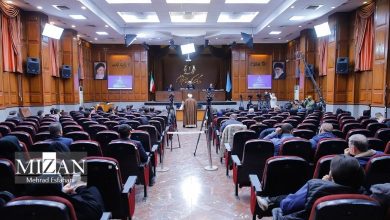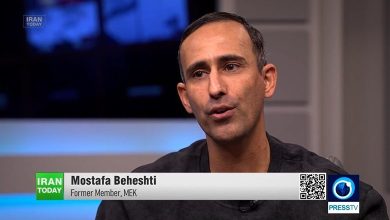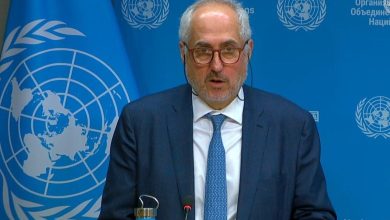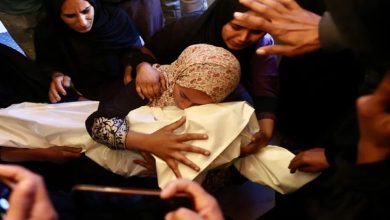The Association for Defending Victims of Terrorism in cooperation with the bodies of Kurdistan Province held the sixth conference of Examples of Patience with the attendance of provincial and national officials, professors, elites, human rights activists and martyrs’ families in Sanandaj. It was organized on International of Remembrance of and Tribute to the Victims of Terrorism.
In addition to provincial officials and the families of the martyrs, six professors and domestic and foreign human rights activists spoke at the conference.
At the beginning of the conference, Ms. Mansoureh Karami, Chairwoman of the Board of Directors of the Association for Defending Victims of Terrorism, thanked the provincial officials and the families of the martyrs and said: “We are proud to hold the sixth conference of Examples of Patience in Kurdistan Province. The Association for Defending of Victims of Terrorism seeks to bring the voice of the oppressed to the world.”
She continued to say that when a terrorist act takes place, it is because of creating intimidation. If people feel insecure in society, they can no longer live in the way they want and thus others can affect that society.
“Our hope is to see terrorism eradicated from the world, but the international community has not paid enough attention to the families of the victims, and we want to tell the international community that they need to pay more attention to the victims,” Ms. Mansoureh Karami concluded.
Then, Dr. Khodabandehlou, a member of the Kurdistan Veterans Association, said, “Thousands of martyrs have dedicated their lives to the revolution and each of them has been martyred in a certain way, but the most cowardly, and unjust method of killing a person is terrorism. I am also the son of a martyr and we have many martyrs of terrorism in Kurdistan province, and I thank the Association for Defending Victims of Terrorism, which organized this conference.
Afterwards, Ms. Zohreh Haghpanahi, a survivor of terrorism, read a message from UN Secretary-General Antonio Guterres on the International Day of Remembrance of and Tribute to the Victims of Terrorism. Part of this message says:
“Today, we remember and pay tribute to all victims and survivors of terrorism. We support survivors by listening to and amplifying their voices, upholding their rights and providing the support, justice and dignity to which they are entitled.”
In another part of his message, the UN Secretary-General stated that, “The United Nations is committed to a world free from terrorism. On this International Day of Remembrance of and Tribute to the Victims of Terrorism, and on all days, let us stand in solidarity with all victims and survivors so we may support them in healing their trauma and bring them hope.”
In another part of the conference Hojjat al-Islam Pourzahabi, the representative of the Supreme Leader in Kurdistan province, said in a speech, “I thank all the people who organized the meeting. These days we have special anniversaries and martyrs Rajaei and Bahonar are martyrs of terror. We have three words in Islamic thoughts which are Irhab, Ightial and Fatk. Irhab which means terror is more conventional and means fear that does not lead to murder,” he continued. Typically, in Arab countries, terrorists are called Irhabion. The second means terror, and Fatk means careless killing.
The representative of the Supreme Leader in Kurdistan Province further stated that some attention should be paid to the nature of this action. The essence of a terrorist act is not humane. In the Quran, Surah Asra, verse seventy, says about this that we honored the children of Adam, all the sons and daughters of Adam. On land and at sea, etc., divine blessings are given to all people in the world and are not exclusive to Muslims. Therefore, if someone violates the rights of human beings, he has committed an unjust act through Ightial and terror.
Joseph Wronka, professor of Springfield College of the United States, said in a video message “Holocaust survivor Elie Wiesel, author of the book Night about the concentration camps, said that what hurts the victim the most is not the cruelty of the oppressor but the silence of the bystander.” Now the question is that why are we as bystanders often so unwilling to speak up?”
He continued, “If terrorist acts occur, whether by individuals, groups or the government, what can be done to help the victims?” I will limit this discussion to five distinct yet interrelated societal processes as pertaining to: 1) socialization; 2) the media; 3) getting caught in a web of violence and counter violence. Regarding socialization, some countries immediately teach in their education systems a pledge of allegiance to their country, to their flag and children also learn their national anthems getting dulled perhaps to the words of violence”. In the media, there are constant displays of power through the viewing of parades with long caravans of armaments, and “one dimensional” ways of looking at things. Finally, it is easy to get caught up in a web of violence and counter violence, which by and large society has taught us how to react either consciously or unconsciously. But getting caught up in that morass, will only lead to further violence and counter violence, the challenge being to take responsibility, stop the violence and not respond in kind.”
He concluded by saying that “In this fourth international day to remember and give tribute to victims of terrorism with its broad theme of making connections, it would be worthwhile to reflect and act upon the connections among societal processes, such as those briefly delineated here like being socialized into blind obedience to authority and fear to speak up, which can result in victims of terrorism such as fatalities of war, extreme poverty, domestic violence, whether they be the Kurds in Iran, African Americans in the United States and/or Indigenous Peoples throughout the world. ”
Dr. Zarei, Deputy Governor of Kurdistan was the next speaker at the event. He said, “It is everyone’s obligation to honor the victims and martyrs of terrorism. Terrorism is condemned in any form and with any purpose and it cannot be justified. We must raise the voice of the oppressed martyrs of terrorism to the whole world and talk about the suffering they have tolerated. We are by your side to raise the voice of your oppression to everyone.
Then, Ms. Tara O’Grady, Secretary General of Sentinel, said in a video message, that she had faced an interesting point in an interview with one of the victims of terrorism. She said, “I asked him what helped him after the terrorist incident and he said only one word “Truth”. He said that KNOWING the Truth is not enough, because people will always say when they cannot access Justice “Even the dogs in the street know who did this….” But unless those dogs can get up on their hind legs and stand in the witness box there will not BE Justice unless victims are prepared to find it themselves by PROVING the Truth. Tara O’Grady added that the victim wanted to recreate HOPE for other survivors of terrorist attack and so in 2016 he launched the Truth and Reconciliation Platform, which has provided a platform for victims of the so-called “Troubles” to speak about their personal experiences and to warn the world of the real consequences of using or accepting violence as a means to bring about change.
Secretary General of the Sentinel of Ireland added, “Contact with other victims or survivors is critical, because the community are ‘stronger together’, that there is an invisible ‘bond’ around you together because you understand each other and your grief.”
Next speaker, Dr. Khatibzadeh, spokesman of the Ministry of Foreign Affairs, stated in a video message that “standing by the survivors of terrorism and those who have been wounded by terrorism is as necessary as countering terrorists. Because the loss of even one loved one in a terrorist attack hurts the souls of the survivors more than any other kind of loss, and the pain of these loved ones is deeper than other people.”
He added, “Terrorism and international extremism are the result of political inefficiencies and are not specific to any particular religion. He said, “Terrorism is derived from extremism and evil thought and sinister goals and the use of ineffective tools.”
In another part of his speech, the Foreign Ministry spokesman said that a freeman cannot see the situation in West Asia and deny the role of reckless politicians, Politicians who present war as a normal reality in the region and lie about their achievements and flee and hold symposiums on their achievements after the most best place for extremism is provided and the fire of war is ignited.
Dr. Khatibzadeh continued to say that what we see in Afghanistan is state terrorism in the worst form. Today, Western countries also realize that American quests have paved the way for the presence of ISIS and terrorist groups in the Middle East.
At the end of his speech, he stated that the Islamic Republic of Iran is determined to build a world free of violence and extremism so that people can determine their own destiny and no nation is a tool for the ambitions of others. The most important decider tool for terrorists is to destroy hope. By keeping hope, we can counter against terrorism and extremism.
Following the meeting of Haj Mamousta Faeq Rostami, the Friday Imam of Sanandaj said in a speech, “I thank all the families of the martyrs. The word terrorism is a hated word everywhere in the world and it has no place in any school in the world. Terrorism comes from the black hearts, and the terrorists do not believe in any law or order.” He continued, “in fact, the martyrs of terrorism are the greatest and highest martyrs and o the most oppressed martyrs.”
In another part of his speech, Mamousta Rostami, a member of the Assembly of Experts on Leadership, said that the conscience of humanity is awakening and the international community is awakening to really eradicate terrorism and create a world free of terror.
In the Holy Quran, there is a Surah with the name of Man, which shows the importance of human honor and dignity. The religion of Islam is the religion of moderation, the religion of mercy and the religion of moderation and it condemns all annoying issues. The message of the Holy Prophet of Islam (PBUH) is that there is no superiority among human beings and everyone must worship one God.
Dr. Abbasi, Deputy Minister of Human Rights of the Ministry of Justice, continued the meeting by stating “Since the 1970s, when the United Nations launched measures against terrorism, it was clear that there were problems in designing an agreed regime to fight terrorism.
He went on to say that due to the non-participation of governments, UN resolutions on various terrorist acts have failed and that human beings witnessed one of the largest terrorist acts in the world on 9/11. This attack reflects the double standard view of the West on the issue of counter-terrorism. Dozens and hundreds of terrorist incidents have took place in the world, but unfortunately, we did not see the right reaction from the Security Council. However, when 9/11 occurred in The United States, we saw that they took measures.
Dr. Abbasi concluded: “After 9/11, a good opportunity for the international community was created to universally condemn international terrorism, and we have seen less of such unanimity before.”
Then, Dr. Saeed Khani, who holds PhD in Sociology, said in a speech that the consequences of terrorism can include creating fear, insecurity, fear, panic and anxiety in a society and deprivation of security and freedom, violation of human rights, dissatisfaction and riots and uprisings. He also pointed out the increase in political and social distrust, apostasy, reduced investment and the economic downturn, and the helplessness of women and children due to the spread of terrorism. Dr. Khani concluded by saying that the basic solution in eliminating terrorism is to eradicate poverty, inequality and hunger in society.
Dr. Mahdi Hatami, Ph.D. holder of International Law was another speaker at the conference. He said, “No factor can justify terrorism in the world, and I, as an expert in international law, declare that international law is imperfect in this regard. There are many treaties in the world on this, but they are generally recommended and international organizations also take promotional measures. He continued to say that international instruments refer to the protection of victims and compensation for them.” The issue of Palestine was also mentioned as compensation for the terrorism.
In another part of his speech, the professor of international law stated that we should hold trials in absentia in order to file international lawsuits against terrorists inside the country. There is also a need to establish an international body to support victims of terrorism and produce international documents on victim protection.
In the end of the conference, a number of victims of terrorism spoke about the martyrdom of their loved ones by the crimes of the Hypocrites (MEK), Komoleh, PJAK and Saddam. They asked the national and international officials not to allow the blood of their loved ones to be trampled. They were families of Martyr Fateh Kouhsari (Red Crescent employee), Martyr Seyyed Bahauddin Hosseini (teacher), Martyr Mohi-ud-Din Azizi and Martyr Saedpanah.
The families also stated that we are determined to bring security and hope to life with the Examples of Patience project, and to prosecute and question the terrorists and their supporters for the public opinion. At the end, the special gifts of the sixth Examples of Patience conference was awarded to the honorable families of the victims.





